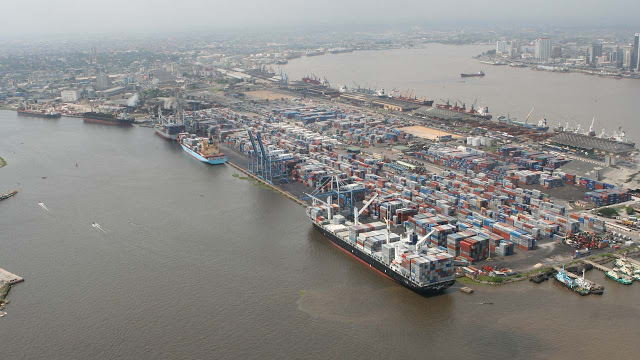 |
| Lagos Sea Ports |
Though the opportunities in African Continental Free Trade Agreement
(AfCFTA) outweigh the drawbacks, the Lagos Chamber of Commerce and
Industry (LCCI) has advocated necessary safeguards, systems, soft and
hard infrastructures including viable ICT policies must be activated to
maximize the potential benefits.
(AfCFTA) outweigh the drawbacks, the Lagos Chamber of Commerce and
Industry (LCCI) has advocated necessary safeguards, systems, soft and
hard infrastructures including viable ICT policies must be activated to
maximize the potential benefits.
Specifically, the LCCI urged the government to maximise benefits
accruable from consumers and market right of access to multiple and
diversified products and services and seek protection against abusive
and injurious parties in and outside Nigeria based on ongoing capacity
expansion of trade laws.
accruable from consumers and market right of access to multiple and
diversified products and services and seek protection against abusive
and injurious parties in and outside Nigeria based on ongoing capacity
expansion of trade laws.
According to a communiqué issued at the end of a stakeholders’ forum
on the AfCFTA held in Lagos, recently, the LCCI noted that the main
argument against the signing of the AfCFTA was stakeholders’ fear of
numerous bilateral trade agreements of some AU countries with the rest
of the world and Nigeria’s underdeveloped industrial and infrastructural
profile.
on the AfCFTA held in Lagos, recently, the LCCI noted that the main
argument against the signing of the AfCFTA was stakeholders’ fear of
numerous bilateral trade agreements of some AU countries with the rest
of the world and Nigeria’s underdeveloped industrial and infrastructural
profile.
Stakeholders argued that there was apprehension because it was
believed that the agreement will potentially make Nigeria a dumping
ground due to its uncompetitive manufacturing sector, large market size
and population.
believed that the agreement will potentially make Nigeria a dumping
ground due to its uncompetitive manufacturing sector, large market size
and population.
Other concerns also bordered on the prevailing disconnect between
regulatory agencies and policy inconsistencies among countries on the
continent, and lack of data on trade within the continent and likely
negative effect of poor statistics on the implementation of AfCFTA.
regulatory agencies and policy inconsistencies among countries on the
continent, and lack of data on trade within the continent and likely
negative effect of poor statistics on the implementation of AfCFTA.
To address some of these challenges, the stakeholders called for
policy coherence and the reinforcement of interconnectivity between
agencies to protect consumers and the Nigerian economy, as well as,
enhance interface between, trade, investment and governance.
policy coherence and the reinforcement of interconnectivity between
agencies to protect consumers and the Nigerian economy, as well as,
enhance interface between, trade, investment and governance.
It was noted that for trade to be effective and benefit from the
AfCFTA existing trade focused bodies such as the Nigerian Diaspora
Direct Investment Summit, National Trade Consultative Committee and the
Nigerian Industrial Policy and Competitiveness Advisory Council should
be bolstered, with trade and infrastructure interconnected.
AfCFTA existing trade focused bodies such as the Nigerian Diaspora
Direct Investment Summit, National Trade Consultative Committee and the
Nigerian Industrial Policy and Competitiveness Advisory Council should
be bolstered, with trade and infrastructure interconnected.
“The LCCI commits to working with the Director General/Chief
Negotiator, Nigerian Office for Trade Negotiation (NOTN), Ambassador
Chiedu Osakwe and take leadership in developing appropriate messaging on
policy advocacy on consumer protection to sharpen standardization
process.
Negotiator, Nigerian Office for Trade Negotiation (NOTN), Ambassador
Chiedu Osakwe and take leadership in developing appropriate messaging on
policy advocacy on consumer protection to sharpen standardization
process.
“NOTN should initiate a standalone Consultation Committee to oversee
routine stakeholders engagement and also clearly articulate all the
inherent risks in the agreement with proposed mitigating measures
available for consumers and business for clarity.
routine stakeholders engagement and also clearly articulate all the
inherent risks in the agreement with proposed mitigating measures
available for consumers and business for clarity.
“Data assessment should be a permanent and continuous process helpful
to the deployment of effective mechanism, trade policy, monitoring and
coordinating.”
to the deployment of effective mechanism, trade policy, monitoring and
coordinating.”
“There should be a robust framework for continuous consultation and
feedback on the agreement and this should be strengthened to accommodate
an extensive media campaign process to forestall further disconnect
with relevant stakeholders”, the communiqué read in part.
feedback on the agreement and this should be strengthened to accommodate
an extensive media campaign process to forestall further disconnect
with relevant stakeholders”, the communiqué read in part.
culled:footprint2africa




